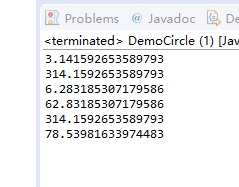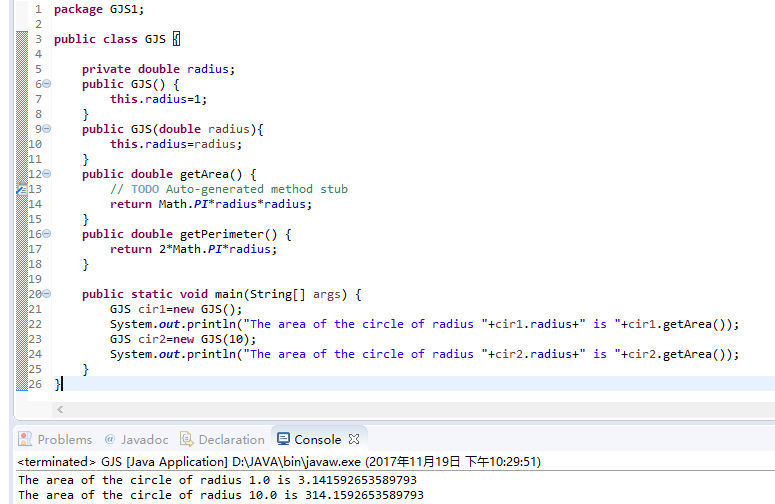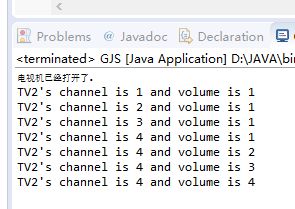11.06第九次、
1——————————————————————————————————————
package GJS1; public class GJS { private double radius; public GJS(double radius) { this.radius = radius; } public GJS() { this.radius = 1; } public double getArea() { return radius * radius * Math.PI; } public double getPerimeter() { return 2 * Math.PI * radius; } public void setRadius(double newRadius) { this.radius=newRadius; } }
package GJS1; public class DemoCircle { public static void main(String[] args) { GJS circle1=new GJS(); double area=circle1.getArea(); System.out.println(area); GJS circle2=new GJS(10); System.out.println(circle2.getArea()); System.out.println(circle1.getPerimeter()); System.out.println(circle2.getPerimeter()); double ridius=10; double areaCircle=Math.PI*ridius*ridius; System.out.println(areaCircle); circle2.setRadius(5); System.out.println(circle2.getArea()); } }

2——————————————————————————————————————————————————————
package GJS1; public class GJS { private double radius; public GJS() { this.radius=1; } public GJS(double radius){ this.radius=radius; } public double getArea() { // TODO Auto-generated method stub return Math.PI*radius*radius; } public double getPerimeter() { return 2*Math.PI*radius; } public static void main(String[] args) { GJS cir1=new GJS(); System.out.println("The area of the circle of radius "+cir1.radius+" is "+cir1.getArea()); GJS cir2=new GJS(10); System.out.println("The area of the circle of radius "+cir2.radius+" is "+cir2.getArea()); } }

3———————————————————————————————————————————————————————————
package GJS1; public class Z { public int channel=1; public int volumeLevel=1; public boolean on=false; public Z() { } public void turnOn() { on =true; System.out.println("电视机已经打开了。"); } public void turnOff() { on=false; System.out.println("电视机已经关闭了。"); } public int getChannel() { return channel; } public void setChannel(int channel) { if(on) { System.out.println("电视机已开,可以开始调台了。"); if(channel>=1&&channel<=120) { this.channel = channel; System.out.println("频道已经调到 "+channel+" 台"); }else { System.out.println("你要调的频道不存在。"); } }else { System.out.println("电视机关着的时候是不能调台的"); } } public int getVolumeLevel() { return volumeLevel; } public void setVolumeLevel(int volumeLevel) { if(on) { System.out.println("电视机已开,声音大小可调了"); if(volumeLevel>=1&&volumeLevel<=7) { this.volumeLevel = volumeLevel; System.out.println("声音的大小设置成了 "+volumeLevel+" 大小"); } }else { System.out.println("电视机关着的时候是不能调声音的"); } } public void channelUp() { if(on&&channel<120) { channel++; } } public void channelDown() { if(on&&channel>1) { channel--; } } public void volumeUp() { if(on&&volumeLevel<7) { volumeLevel++; } } public void volumeDown() { if(on&&volumeLevel>1) { volumeLevel--; } } }
package GJS1; public class GJS { public static void main(String[] args) { // TV tv1=new TV(); // tv1.turnOff(); // tv1.setChannel(30); // tv1.setVolumeLevel(3); Z tv2=new Z(); tv2.turnOn(); System.out.println("TV2's channel is "+tv2.channel+" and volume is "+tv2.volumeLevel); tv2.channelUp(); System.out.println("TV2's channel is "+tv2.channel+" and volume is "+tv2.volumeLevel); tv2.channelUp(); System.out.println("TV2's channel is "+tv2.channel+" and volume is "+tv2.volumeLevel); tv2.channelUp(); System.out.println("TV2's channel is "+tv2.channel+" and volume is "+tv2.volumeLevel); tv2.volumeUp(); System.out.println("TV2's channel is "+tv2.channel+" and volume is "+tv2.volumeLevel); tv2.volumeUp(); System.out.println("TV2's channel is "+tv2.channel+" and volume is "+tv2.volumeLevel); tv2.volumeUp(); System.out.println("TV2's channel is "+tv2.channel+" and volume is "+tv2.volumeLevel); } }







